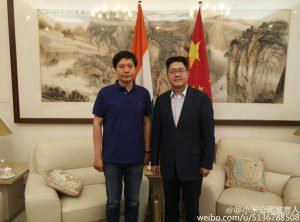 India – China bilateral ties have taken a quantum leap from raw materials to mobiles and technology. Recently mobile phone maker Xiaomi, or little rice in Mandarin received a generous investment from Ratan Tata, former chairman of Tata Sons Ltd. The CEO of Xiaomi, Lei Jun, a 45-year-old billionaire and serial entrepreneur, who last visited India 15 years ago recently visited New Delhi and Mumbai to promote the company. Photo’s of China’s Steve Jobs as he’s often known, posing in front of South Mumbai iconic landmarks and in an autorickshaw went viral across English and Chinese social media last week. Lei Jun came to India, along with co-founder and company president Bin Lin, they met top Indian business leaders, startups, customers and retail partners.
India – China bilateral ties have taken a quantum leap from raw materials to mobiles and technology. Recently mobile phone maker Xiaomi, or little rice in Mandarin received a generous investment from Ratan Tata, former chairman of Tata Sons Ltd. The CEO of Xiaomi, Lei Jun, a 45-year-old billionaire and serial entrepreneur, who last visited India 15 years ago recently visited New Delhi and Mumbai to promote the company. Photo’s of China’s Steve Jobs as he’s often known, posing in front of South Mumbai iconic landmarks and in an autorickshaw went viral across English and Chinese social media last week. Lei Jun came to India, along with co-founder and company president Bin Lin, they met top Indian business leaders, startups, customers and retail partners.
The company has big plans for India, where they plan to set up a local manufacturing center, expand their R&D center and emerge as India’s premier handset manufacturer by 2020. All this while maintaining their core USP of selling their handsets online only, while offering consumers a touch and feel experience before buying at select stores.
Just weeks ahead of Indian Prime Minister Narendra Modi’s visit to Beijing India has become a hot buzzword in Chinese VC and investment circles. Aided by the central government and coxed by a tightening market at home, Chinese companies are keen to invest in India’s 1.3+ billion market. Jack Ma, Founder and CEO of B2B, Alibaba recently invested in Indian payment gateway Paytm and has set up an incubation cell in Bangalore to explore investments in the IT and mobile space.
The move to invest in India, is both strategic and politically sensitive. With a large market and now a Foreign investment favourable government at the helm, Chinese companies have poured in billions into India. Many large ticket deals, expected to rival China’s commitment of $49 billion to Pakistan will also be signed during the Modi – Xi visit.
 While a boon for Indian enterprises and industries, Chinese investments having moved up the value chain from steel and raw materials to technology signals a strategic shift in China’s relations with India. New Delhi might be keeping watch on the growing Chinese investments, but she’s also playing her cards for the border. On one hand India can allow China access to her burgeoning market, but she will also demand her right on contested border territories China claims isn’t a big issue. Keen to make sure the ballooning trade deficit with China doesn’t go in vein, New Delhi needs to start playing her political cards right.
While a boon for Indian enterprises and industries, Chinese investments having moved up the value chain from steel and raw materials to technology signals a strategic shift in China’s relations with India. New Delhi might be keeping watch on the growing Chinese investments, but she’s also playing her cards for the border. On one hand India can allow China access to her burgeoning market, but she will also demand her right on contested border territories China claims isn’t a big issue. Keen to make sure the ballooning trade deficit with China doesn’t go in vein, New Delhi needs to start playing her political cards right.
